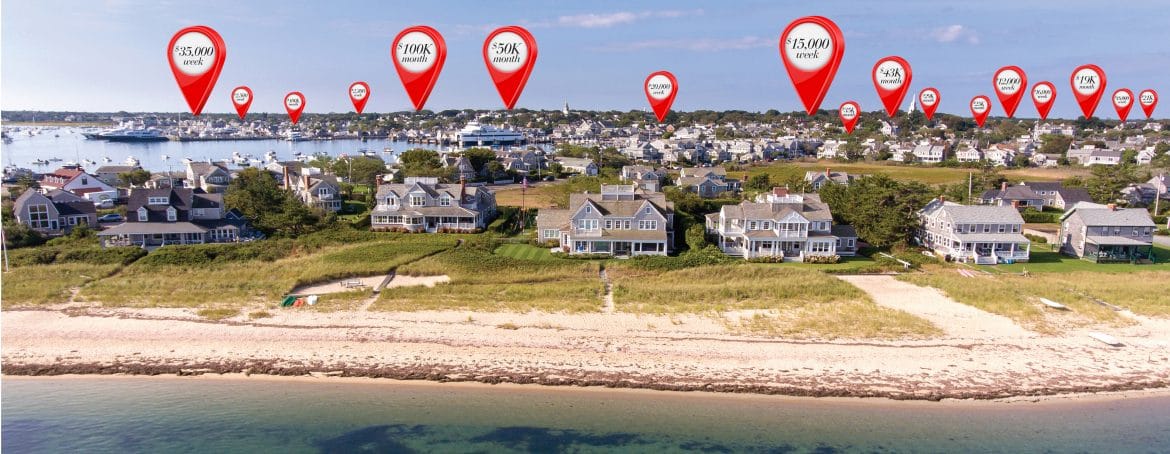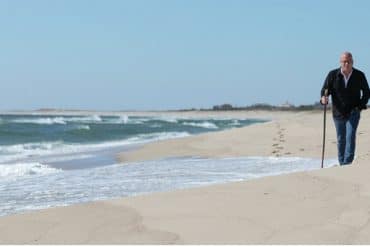The short-term vacation rental controversy plays out on Nantucket.
With a controversial proposal that could reshape one of the pillars of Nantucket’s tourism economy—the short-term vacation rental market— the nascent island organization known as ACK•Now has made a splash over the typically quiet offseason. The group’s bylaw proposal to regulate and restrict short-term rentals has spawned an intense debate that encompasses property rights, affordable housing and community character, while also catching the attention of the giant online platforms like Airbnb and VRBO that facilitate them.
Founded by Peter McCausland, a longtime Nantucket summer resident and the retired CEO of Airgas Inc., a massive distributor of industrial and medical gases, ACK•Now has encountered significant backlash from critics of its bid to rein in short-term vacation rentals. They argue that ACK•Now’s bylaw would trample on individual property rights and have far-reaching, unintended consequences, including kneecapping sectors of Nantucket’s economy that rely on short-term rental activity, and hurting part-time residents who care for and invest deeply in the community.
 But the organization continues to assert that investor-owned short-term rentals are driving up home prices and rental rates, disrupting year-round neighborhoods and resulting in the loss of year-round homes as well as over-development that threatens the very character of the island. The rhetoric has ratcheted up over the spring, but like any policy debate, the issue is perhaps best illustrated by the people who are watching anxiously and considering how it could impact their lives.
But the organization continues to assert that investor-owned short-term rentals are driving up home prices and rental rates, disrupting year-round neighborhoods and resulting in the loss of year-round homes as well as over-development that threatens the very character of the island. The rhetoric has ratcheted up over the spring, but like any policy debate, the issue is perhaps best illustrated by the people who are watching anxiously and considering how it could impact their lives.
Alison Taylor and her brothers don’t live in the home their father and grandfather built in Madaket, but it’s still in the family. Alison was born and raised on Nantucket and has a strong connection to the island even though the high cost of living led her to live off-island on Cape Cod. She and her brothers rent the family home on Nantucket by the week during the summer season to afford the taxes and upkeep, with the hope that they can spend a week or two there themselves when the offseason rolls around. “We’re all priced out, so this is our last heritage,” Taylor said. The ability to do short-term rentals of the property on WeNeedAVacation.com has allowed her to retain that foothold on Nantucket, she said.
Down the road from Taylor’s home, another Nantucket native, Hollis Webb, has also managed to keep the house he grew up in on Dukes Road where he now lives year-round. But for Webb, an Army veteran who works in preservation carpentry on Nantucket, the neighborhood feels different these days. The house next door is a short-term rental that goes for nearly $10,000 per week, and a massive 12-foot concrete retaining wall has been constructed behind his house to allow for the construction of a pool and cabana structure at what he believes will be another short-term rental property.
“I was born on Dukes Road, my son was born on Dukes Road, and when I was growing up here, there were kids running up and down the road. It was a neighborhood,” Webb said. “Now I have three pools and pool decks surrounding me, and a fourth on the way. I feel like an old man saying this, but the noise is so outrageous my property is almost unlivable. There’s so much activity and so much drinking, so I’m thinking of ways to put up barriers to keep drunk kids out.” Webb and Taylor’s disparate experiences showcase the crux of the unfolding controversy over short-term vacation rentals.
ACK•Now’s executive chairman, former Select Board member and island native Tobias Glidden, has been the frontman for ACK•Now and the short-term rental bylaw it has put forward. He lays out the issue in stark terms: “Short-term rentals are the biggest culprit in the loss of people and homes on the island. We need control over our destiny. But we’re poorly equipped to deal with investors gobbling up homes in residential neighborhoods and turning them into hotels.”
The bylaw proposal to rein in short-term rentals would restrict and regulate them in several ways. All short-term rentals would be required to have a minimum stay length of seven days and be limited to two people per bedroom and one vehicle per rental. Non-resident island homeowners would be limited to renting their property for no more than 45 days per year, while residents would be restricted to renting their home up to 90 days annually. Short-term rental property owners would be required to register with the town, pay additional fees and be subject to daily fines for any offenses.
In response to the pushback it has received from year-round and part-time residents, ACK•Now has indicated it intends to amend its original proposal at Town Meeting by eliminating restrictions for full-time islanders who rent their homes on a short-term basis.
But for Alison Taylor, the Madaket homeowner, the proposed restrictions and regulations could mean losing the home that has been in her family for more than seventy years. “It’s heartbreaking, actually,” Taylor said. “Within a few years we’d be going in the hole and have to sell it. This is so far-reaching.”
ACK•Now has attempted to define its fight as one against “investor-owned” short-term rentals, rather than people like Taylor. The group wants to target owners who have acquired residential homes as a business opportunity, with the sole aim of running a mini-hotel and maximizing their profit. The state’s public registry of lodging operators identifies a total of 2,017 short-term rental properties on Nantucket, a number that ACK•Now has seized upon in its communications. But how many of those 2,000-plus properties should actually be considered “investor-owned” short-term rental properties is unclear, and opponents believe the true number is actually quite small.
“This is a national industry now and not something Nantucket is immune to,” ACK•Now’s executive director Julia Lindner said of investor-owned short-term rentals. “It’s a tidal wave that is just going to keep coming. Twenty percent of our housing stock is in short-term rentals now. What’s it going to look like if it gets to 40 percent or 50?”
ACK•Now operates as a not-for-profit 501(c)(4) group, otherwise known as a social welfare organization. It is a different designation from the more common 501(c)(3) nonprofits and allows ACK•Now to engage in lobbying and political activities. Not only has its bylaw proposal been highly scrutinized, but the group’s connections to Nantucket’s only newspaper, The Inquirer and Mirror, have put the paper’s coverage of the issue under a microscope.
Nantucketer David Worth, who leads the group of investors known as 41 North Media LLC that purchased The Inquirer and Mirror in late 2020 after decades of corporate ownership, previously served as ACK•Now’s board chair. While he resigned from that role and severed ties from ACK•Now in September 2020—shortly before the acquisition of the newspaper—the prior relationship has fueled speculation that ACK•Now is somehow influencing the paper’s coverage of the organization’s proposal. While Worth is still listed on the Massachusetts Secretary of State’s corporate database as ACK•Now’s “resident agent,” he said the state had simply not yet updated the listing despite the group having filed to change the incorporation documents to reflect his resignation.
 “Unequivocally, I state that I have no direct or indirect ties to the organization [ACK•Now], its directors and officers, having severed my ties last September and am definitely not their resident agent,” Worth said in an email to N Magazine. “Aside from my former involvement with ACK•Now, there has never been any relationship between the Inky, our investors and Mr. McCausland, ACK•Now and its directors or officers.”
“Unequivocally, I state that I have no direct or indirect ties to the organization [ACK•Now], its directors and officers, having severed my ties last September and am definitely not their resident agent,” Worth said in an email to N Magazine. “Aside from my former involvement with ACK•Now, there has never been any relationship between the Inky, our investors and Mr. McCausland, ACK•Now and its directors or officers.”
On March 18, The Inquirer and Mirror published an editorial calling for ACK•Now’s proposal to be tabled for this year’s Town Meeting, reworked and brought forward again in 2022.
On its website, ACK•Now names companies like Inspirato and The Copley Group as the culprits that are outbidding island police officers, firefighters and teachers for homes in year-round neighborhoods, converting those properties to short-term rental businesses and only paying residential property tax rates.
The Copley Group, which owns fourteen vacation rental homes around the island, is being unfairly targeted by ACK•Now, said its founder and president Norman Levenson. “[ACK•Now] doesn’t seem to understand that the island’s major economy is tourism,” Levenson said. “Without the rental homes on the island, the economy wouldn’t be the same. The restaurants won’t do the same, the shopkeepers, it trickles down to the t-shirt shops, the charter boats, the tour buses. The people who live on the island year-round, they work in all these places. I’ve been coming to the island for 50 years. My family has grown up there, my kids worked on the island. We love the island. We didn’t just show up one day from Boston and start buying up all these investment homes with no care for the island.”
Yet ACK•Now has claimed that due to The Copley Group and other short-term vacation rental operators the island has lost more than 600 year-round rentals over the past eight years. This assertion has been vigorously disputed by Nantucket Together, one of several opposition groups that have organized to defeat ACK•Now’s proposal. Nantucket Together believes ACK•Now is mischaracterizing federal data, and that most of those 600 homes are actually listed as “vacant homes” that were bought by people who do not engage in short-term rentals.
Hollis Webb, the Dukes Road homeowner, said that despite the impact of short-term rentals on his neighborhood, he is still undecided on whether to support ACK•Now’s proposed bylaw. The thought of restricting property rights and the freedom to rent his home how he sees fit gives him pause. “I don’t know what ACK•Now is but I know there needs to be change,” Webb said. “I’m not the only local that’s affected by this formula that exists—fix up your house, cookie-cutter landscaping, pool and pool house, and that’s a maximized short-term rental.”
Henry Sanford, an island real estate agent and hotel manager, has been one of the leading voices raising concerns about the proposed restrictions. Sanford has emphasized the potential economic impacts and said that even with the potential amendments to lessen the impact on year-round residents, he estimates the proposed limits would still apply to more than 80 percent of short-term rentals on Nantucket. “What will get crushed are all the festivals during the nine-plus-month shoulder season, ones the Chamber of Commerce has spent decades promoting and are relied upon by businesses to make the summer season more sustainable,” Sanford said. “The important fact to realize is that in ACK•Now’s best-case scenario all home values decrease from a decrease in visitor access, which leads to decreased vacationer spending, a shorter season and decreased livelihoods for all of us who depend on that season. We cannot make policy that seeks to benefit one group while hurting another group. Especially a bylaw whose results are not quantifiable. We are all on this island together, and many of the off-island families most affected by this article are people we call friends, customers, clients and family.”
The controversy over short-term rentals has been playing out across the country, pitting cities and communities of all sizes against the giants of the industry like Airbnb and VRBO. Many other municipalities have attempted to regulate and restrict short-term rentals, some successfully, with local bylaws and zoning amendments. The massive internet platforms that facilitate and monetize them have countered by organizing their users, or “hosts,” and fighting back in court.
 These major vacation rental platforms have already taken note of ACK•Now’s bylaw proposal for the island and have spearheaded calls to action in the form of emails to Nantucket property owners urging them to oppose the warrant article. “We encourage you to get involved today to ensure your short-term rental is not subject to burdensome regulations in the future,” read an email from VRBO’s government affairs team to some island homeowners.
These major vacation rental platforms have already taken note of ACK•Now’s bylaw proposal for the island and have spearheaded calls to action in the form of emails to Nantucket property owners urging them to oppose the warrant article. “We encourage you to get involved today to ensure your short-term rental is not subject to burdensome regulations in the future,” read an email from VRBO’s government affairs team to some island homeowners.
On Nantucket, it’s still unclear whether ACK•Now’s platform has resonated at all with the year-round community that will vote on the bylaw proposal in June. But a groundswell of opposition has manifested in online discussions, and the group of part-time residents that formed Nantucket Together to challenge ACK•Now’s proposed bylaw has fully engaged on the issue. Kathy Baird, one of the co-founders of Nantucket Together, owns a three-bedroom saltbox in Tom Nevers that she and her husband rent through Airbnb when they are not staying in it themselves. Like many part-time residents, they rely on the income from short-term rentals to cover the taxes and expenses of the home, and have a strong connection to the property and the community where their children now live and work. They rent to families who typically come for a weekend, a length of stay that would be prohibited under the proposed bylaw.
“To me the question is what damage are we doing? How would this actually help affordable housing?” Baird asked rhetorically. “If that [investor-owned short-term rentals] was their target, they would have tons of support. They say that’s their target, but that’s not all who would be affected. The collateral damage is a lot bigger than intended.”
That question—whether restricting short-term rentals would create or sustain affordable year-round housing in any meaningful way— has been vigorously disputed.
“Last year we lost 65 homes to short-term rentals, so if we want to be serious about having affordable housing in the future, we must address the short-term rental issue,” Glidden said. “Limiting the change from year-round homes to short-term rentals preserves affordable housing in the future.”
The Nantucket Affordable Housing Trust, which is advocating for several affordable housing initiatives at this year’s annual Town Meeting, declined to take a formal position on ACK•Now’s proposal. “It’s a hot potato,” said Affordable Housing Trust vice chair Brooke Mohr. “This should be part of a bigger conversation, but there’s no doubt that Airbnb has changed the landscape everywhere and we’re no exception to that. But what the data shows is unclear about the contribution to the problem, the degree it contributes and the degree regulations could contribute to minimizing the problem if it’s determined there is one.”
The proposed bylaw, which received a unanimous negative recommendation from the Town of Nantucket Finance Committee, now heads to a decisive vote on June 5 during the Town Meeting. Only year-round residents can vote when Nantucket’s legislative body convenes. If approved, the bylaw would take effect on October 1.








